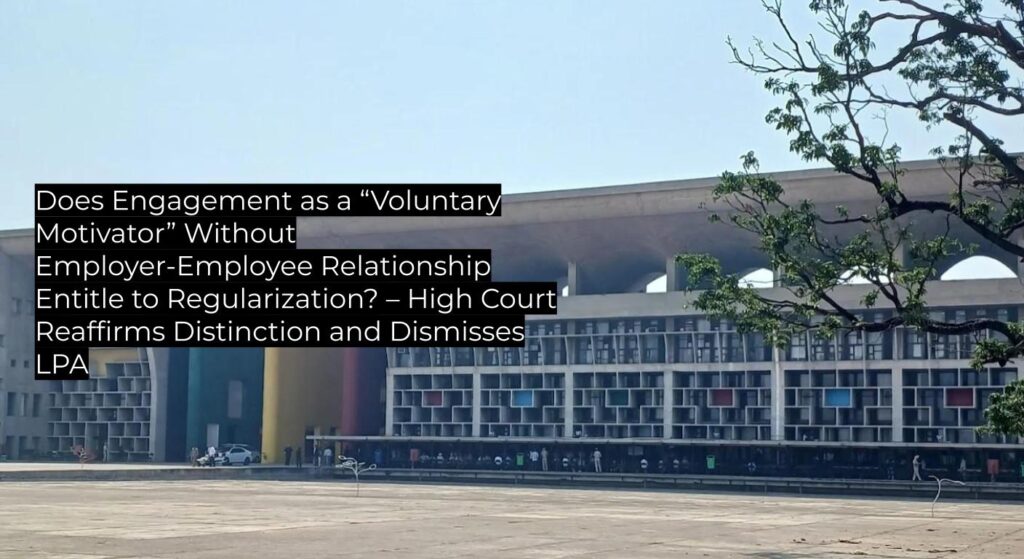The High Court reiterates that individuals engaged voluntarily, paid solely on outcome/productivity basis without an employer-employee relationship, cannot seek regularization as government employees. The judgment affirms existing precedent and solidifies its applicability for public sector voluntary engagements, providing binding authority within Punjab and Haryana.
Summary
| Category | Data |
|---|---|
| Case Name | LPA/1694/2025 of JAGDEV SINGH AND OTHERS Vs STATE OF PUNJAB AND OTHERS |
| CNR | PHHC010915592025 |
| Date of Registration | 31-05-2025 |
| Decision Date | 02-09-2025 |
| Disposal Nature | DISMISSED |
| Judgment Author | MR. JUSTICE ANUPINDER SINGH GREWAL, MR. JUSTICE DEEPAK MANCHANDA |
| Court | High Court of Punjab and Haryana |
| Bench | Division Bench |
| Precedent Value | Binding within jurisdiction of Punjab and Haryana High Court |
| Overrules / Affirms | Affirms the judgment of the Single Judge Bench denying regularization |
| Type of Law | Service Law, Employment & Labour, Public Sector Engagements |
| Questions of Law | Whether voluntary, incentive-based engagements without an employer-employee relationship entitle individuals to regularization as government staff |
| Ratio Decidendi |
|
| Facts as Summarised by the Court |
|
Practical Impact
| Category | Impact |
|---|---|
| Binding On | All subordinate courts in Punjab and Haryana |
| Persuasive For | Other High Courts and, to a limited extent, administrative tribunals dealing with similar contexts |
| Follows | Affirms the principles in the underlying Single Judge decision regarding non-regularization |
What’s New / What Lawyers Should Note
- Reconfirms that individuals engaged on a voluntary, incentive-only basis, with no promise of regularization and explicit denial of employer-employee relationship in the engagement letter/advertisement, are ineligible for regularization as government employees.
- The issuance of identity cards or the provision of additional marks for other applications does not create an employment relationship.
- The contractual terms and actual mode of engagement rule out any subsequent claim of regularization, regardless of years of service rendered.
Summary of Legal Reasoning
- The Division Bench reviewed the facts, noting that appellants served as Motivators/Master Motivators and their engagement was voluntary, with payment strictly contingent on output.
- The advertisements and official communications explicitly stated no employer-employee relationship existed between the Department and the Motivators.
- Identity cards were provided solely to enable work in villages, not as evidence of employment.
- The Court highlighted that appellants could engage in any other employment or business, underlining the non-exclusive, non-contractual nature of their engagement.
- Given the absence of an employment relationship and consistent official stance, the claim for regularization was rightly denied by the Single Judge, and the appeal was consequently dismissed.
Arguments by the Parties
Petitioner (Appellants):
- Appellants had put in over eight years of service as Motivators/Master Motivators.
- Claimed entitlement to regularization.
- Argued that their representation was decided without affording an opportunity of hearing.
Respondent (State of Punjab):
- Appellants were engaged voluntarily, paid on outcome/productivity basis only.
- No fixity of tenure, no retainership, no employer-employee relationship existed.
- Identity cards were merely to facilitate village work.
- Engagement did not bar them from other employment.
- Advertisement clearly denied employer-employee relationship.
- Appellants could apply for other posts with some additional marks for relevant experience, and some had unsuccessfully competed.
Factual Background
The appellants, after serving as Motivators/Master Motivators on a voluntary basis for more than eight years, sought regularization as Block Resource Coordinators-cum-Community Facilitators. Their engagement was governed by advertisements and departmental orders making clear there was no employer-employee relationship and remuneration was given strictly on the basis of output or productivity, not as salary or retainership. They also had the freedom to pursue other jobs. Some appellants applied for regular posts (with eligibility for extra marks) but were not selected. Their claim for regularization was denied by both the departmental authorities and the Single Judge, leading to this appeal.
Statutory Analysis
- The judgment considers the contractual and statutory framework controlling scheme-based government engagements.
- Emphasis is placed on the explicit terms in the advertisement, which specifically denied the establishment of any employer-employee relationship.
- No reference is made to any expansive or restrictive statutory interpretations; the focus is on the terms of engagement.
Alert Indicators
- ✔ Precedent Followed – The Division Bench affirms the established legal position on non-regularization of voluntary, incentive-based scheme workers.


